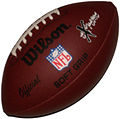 Section 1 of the Sherman Act prohibits concerted actions unreasonably restraining trade, but exempts collective actions by separate business entities who share a complete unity of interest. Whether § 1 applies to the major professional sports leagues has long been a matter of debate. On the one hand, each team is separately owned and seeks to maximize its own profits. On the other hand, each team has an important shared interest in maintaining a full league of competitive teams — who will pay to see the Yankees if they effortlessly crush all opponents? So, does a league potentially violate § 1 when it blocks its members from entering into individual merchandising or broadcasting deals?
Section 1 of the Sherman Act prohibits concerted actions unreasonably restraining trade, but exempts collective actions by separate business entities who share a complete unity of interest. Whether § 1 applies to the major professional sports leagues has long been a matter of debate. On the one hand, each team is separately owned and seeks to maximize its own profits. On the other hand, each team has an important shared interest in maintaining a full league of competitive teams — who will pay to see the Yankees if they effortlessly crush all opponents? So, does a league potentially violate § 1 when it blocks its members from entering into individual merchandising or broadcasting deals?
Matt Mitten reviews the history of litigation addressing this issue in a new paper on SSRN. His analysis concludes with a discussion of the Supreme Court’s most recent pronouncement on the question, American Needle, Inc. v. National Football League, 130 S. Ct. 2201 (2010). In American Needle, the Court held that the NFL’s grant of an exclusive trademark license to a headwear manufacturer was not immune from § 1 scrutiny. The Court wrote, “Common interests in the NFL brand partially unite the economic interests of the parent firms, but the teams still have distinct, potentially competing interests.” Although the question is a difficult one, Matt argues that Court reached the right result. The paper is entitled “American Needle v. NFL: U.S. Professional Clubs are Separate Economic Threads When Jointly Marketing Intellectual Property.”
